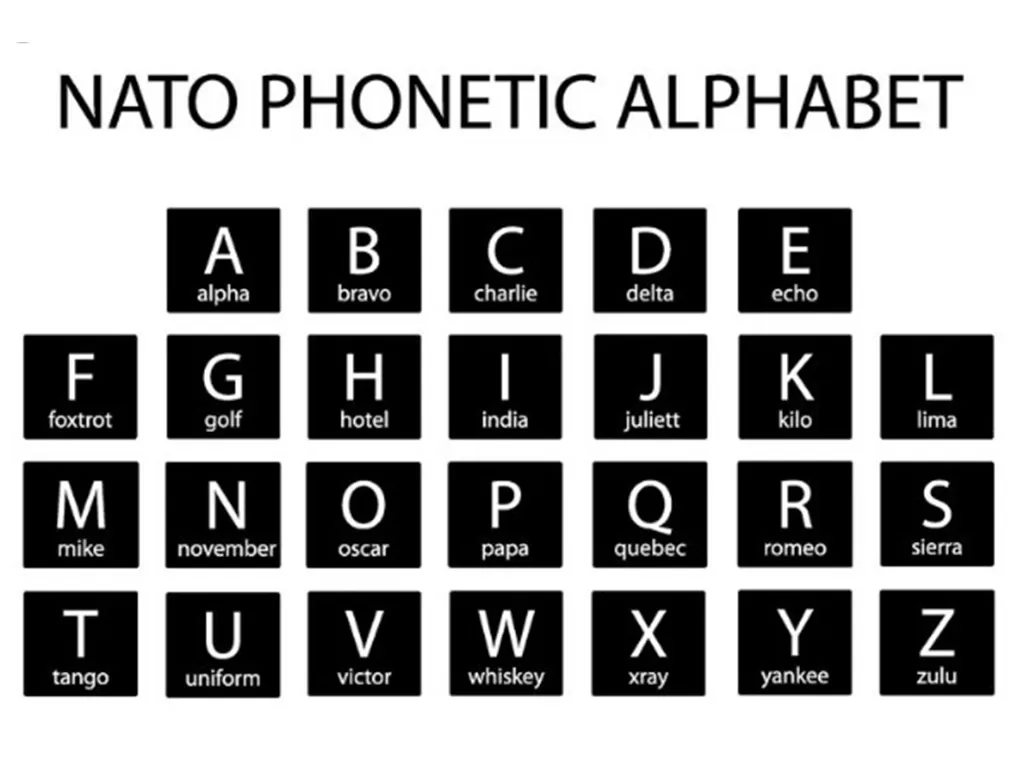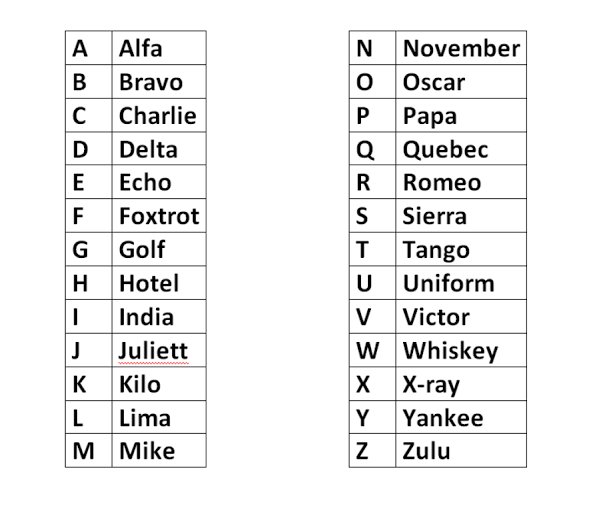Alfa beta delta golf

Phonetic Alphabet. A. ALPHA. B. BRAVO. C. CHARLIE. D. DELTA. E. ECHO. F. FOXTROT. G. GOLF. H. HOTEL. I. INDIGO. J. JULIET. K. KILO. L. LIMA. M. MIKE. N. A Alpha. B Bravo. C Charlie. D Delta. E Echo. F Foxtrot. G Golf. H Hotel. I India. J Juliet. K Kilo. L Lima. M Mike. N November. O Oscar. P Papa. Q Quebec. R. A, *- Alfa ; B · -***, Bravo ; C · -*-*, Charlie ; D · -**, Delta. A. ALPHA. B. BRAVO. C. CHARLIE. D. DELTA. E. ECHO. F. FOX-TROT. G. GOLF. H. HOTEL. I. INDIA. J. JULIETT. Alfa beta delta golf. KILO. L. LIMA. M. MIKE.
The Military Alphabet (Phonetic from Alpha Bravo Charlie Delta to Zulu)
Yes, an earlier army alphabet it is, and its first letter was "able", not "Abel". Okay, all the alcohol's out of the system. So much for trusting one's addled memory. Thank you all, brethren and cistern in English usage, for the corrections. Sorry about the ones I couldn't remember. Each of the alpha signs was divided into ten numerical signs, enabling taxicabs to be individually identified.
I do remember that "Don 1" was a sought-after call-sign. Probably still is. Z should be "zulu. No, they don't. Any reason why you think they might. I'll take five. I especially like the whooshing sound of them as they go flying by. IBM used to s or so use that one, or a variant.
If it is the same, I can fill in the "L" space. I was a civilian writer-illustrator with the University of California Division of War Research, and one of our editors was named E. He became known as "Easy Love" Jones -- so there's the "L" -- "love.
You are forgiven. Alfa beta delta golf I thought maybe "metaphor or parody" would be more appropriate to describe it. The whole thing, from memory but at least I'm sober this time: able, baker, charlie, dog, easy, fox, george, how, item, jig, king, love, mike, nan, oboe, peter, queen, roger, sugar, tare, uncle, victor, william, xray, yoke, zebra.
This is not the only known variant, but I found it originally in a WWII Navy communications text, so I assume it had official status at some point. Bob Lieblich. You look at your passport. If it's a British passport, you're British. Sheesh, Bun, don't you know anything?
Some were used more often than others, in diffeent pin numbering schemes. That should be "How do you know. Are you British. I know because The British would have no reason to put an 'eee' sound before the 'zed' when naming that letter. Only by heritage.  I'm still waiting for the first five I asked for. The old US military phonetic used "Roger.
I'm still waiting for the first five I asked for. The old US military phonetic used "Roger.
The single-letter meaning for Roger was "I understand or have received your message," as in "Roger, wilco" I understand and will comply. This has gone into mariners' language and probably other folks' as well in such expressions as "Yeah, roger," or "Roger that," meaiing"You betcha. Several common errors occur in this setting. One of the most glaring is "Over and Out.
No reply is necessary. Not so. While you might argue that 'wilco', which is an abbreviation of 'will comply', contains an implicit 'I understand', as well as an implicit 'message received', it is by no means explicit in the term 'wilco'. While just 'out' would do the trick, 'over and out' makes it clear that the person on the other end is free to have the last word.
I wouldn't call it an error. There is no redundance at all, at least not in standard NATO military radio voice procedure - the usage in some national military and civilian organizations may differ. These are two separate responses. A commander receiving an order to move his troops could reply "wilco".
If the same order was received by his signaller the reply would be "roger", because the signaller does not have the authority to comply. All such words known as prowords in radio voice procedure have very specific meanings. The French equivalent is "a vous", while the Italian and Spanish equivalent is "cambio" - the meaning is clear. As Armond writes, no reply is necessary.
John L. My comments are based on stand radio procedure. Taking a slightly broader view, I don't imagine this is too great a problem. Surely within the fraternity of radio communications professionals there are subsets similar to those in a. There's probably even a "Radio Neil. We often say and hear a modification like "roger, out.
I am ending this communication and expect no further reply. If we were to have a list of least favourite words to parallel the current favourites list, mine would without hesitation be "judgemental". A few notes: First, "list" usually implies more than one entry.
Second, my list would start with "Ugh. Fourth, I'm not being judgmental. Yes it would be if it were. As it is, it is a set phrase, in use for scores of years by military and other radio users. Decoded, "over and out" means "It is your turn to speak but I'm not going to listen. Often used is 'Roger and Out to you'.
Using the phonetic alphabet helps to minimize any misunderstandings between the cockpit and the tower. In addition to assigning the letters, the ICAO phonetic alphabet also designates specific numbers. Best golf betting tips Like the letters, the objective is to prevent any misunderstandings with numbers that have a similar sound. Hence, some numbers are pronounced differently from their standard English pronunciation, such as three as tree tri , five as fife, and nine as niner.
The adoption of the ICAO alphabet allows pilots to effectively convey their location, estimated time of arrival, crew service requirements and aircraft tail number. Due to the significant amount of Delta Airlines traffic at the airport, the decision was made to adopt an alternative name or word that would be recognizable and clear to pilots from all countries.
The fundamental requirements for the chosen words were that they had comparable spellings in English, French, and Spanish and were valid words in each of these languages. ICAO established its phonetic alphabet as a global standard on November 1, , to communicate English letters via radio or phone.
The decision to create a single universal alphabet was made due to dissatisfaction with the existing internationally recognized phonetic alphabet. The existing alphabet was submitted to ICAO for review and the organization had concluded that it was not effective in communicating letters and numbers clearly, particularly in international aviation operations. As a result, the ICAO created a new, more effective phonetic alphabet that has since been widely adopted by aviation organizations around the world.
In the wake of this research, as well as the feedback from all ICAO Member States, and in consultation with communication specialists, the new ICAO phonetic alphabet was adopted and integrated into the Aeronautical Telecommunications Annex 10 for application in civil aviation.
The words that represented the letters C, M, N, U, and X were substituted, and the final version was approved by the Organization on March 1, Aviation Explained Aviation History. Glossary of the Phonetic Alphabet used in aviation Have a look at how the aviation phonetic alphabet can be used to convey messages including Morse code.
Popular Pages
- Saudi international golf betting
- Dp world tour dfs picks
- Beto puting disc golf
- Pga tour predictions this week
- What are greenies and sandies when betting on golf
- Masters golf betting tips 2016
- Golf futures odds
- 3m open field leaderboard
- How does dead heat work in golf betting
- Alfa beta charlie delta echo foxtrot golf
- Beta links golf kappa alpha psi
- Pga valspar leaderboard 2023
- Us open golf best bets
- Golf betting withdrawal
- Are beta blockers legal in golf